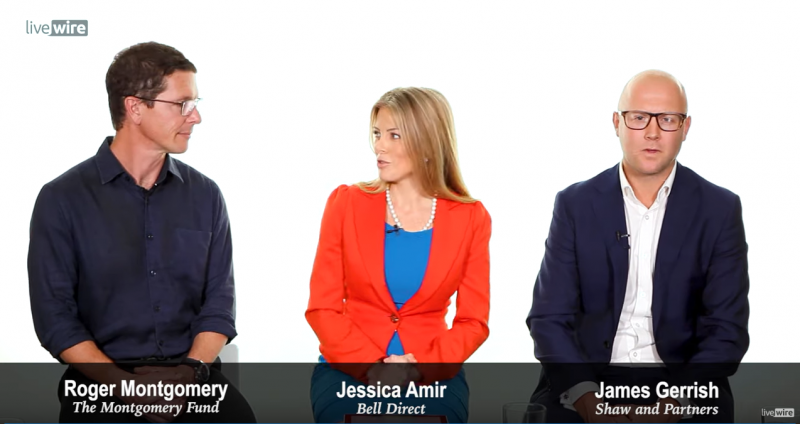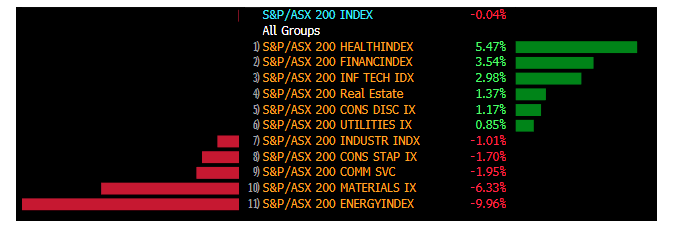Buoyed by the US-China trade deal agreement, stock markets marched in unison to record highs at the start of 2020. That was until coronavirus started dominating headlines in late January. This sparked a panic sell-off in certain stocks like Sydney Airport and Qantas while putting a rocket under healthcare and, interestingly, IT companies (see the sector performance chart in the transcript below).
In this episode of Buy Hold Sell, Jessica Amir from Bell Direct hosts Roger Montgomery of Montgomery Investment Management and James Gerrish of Shaw & Partners who share their perspectives on which parts of the market may in fact stand to perform amid coronavirus. They also discuss how this pubic health emergency could intersect with central bank policy and how investors can navigate themselves and their portfolios through these kinds of ‘Black Swan’ events.
Notes: You can access the video or edited transcript for this Buy Hold Sell episode below. This episode was filmed on 12 February 2020.
Edited Transcript
Jessica Amir: Welcome to Buy Hold Sell brought to you by Livewire Markets. Today we're talking about the coronavirus, its infection on markets and if it's providing a short term buying opportunity. My name is Jessica Amir. I'm from Bell Direct, proudly with Roger Montgomery from Montgomery Investment Management and James Gerrish from Shaw and Partners. Roger, let's start with you. Coronavirus. Since the outbreak, we've seen the resources, energy and staple sectors take a hit. What does the outbreak mean for investors? Is it a buying opportunity?
Investments feeling the impact
S&P/ASX 200 - Sector Performance (22 January 2020 to 17 February 2020)
Source: Bloomberg, Bell Direct
Roger Montgomery: Well, it really does depend on the sector. If you take banks, for example, they probably benefit from their defensive status in this kind of situation. If China slows down a lot, you could see pressure on the Australian Dollar, so people might look to banks for the defensive and healthcare as well. If you look at travel, Qantas (ASX:QAN), probably no impact really, because only 2% of their scheduled international flights for this year are from China. So not a big deal. But on the other hand, Sydney Airports (ASX:SYD), a really big impact, potentially because 10% of their traffic and their arrivals are from China, and Chinese visitors spend a lot more at the high-end shops at the international terminal.
So it really depends on the sector. It depends on the stock. Retail, probably not a big impact generally, unless you're a high turnover retailer and if you've got disruption to your supply chain, and you can't get stock or you can't sell stock. So companies like Lovisa (ASX:LOV) for example, they may have some issues if this shutdown in China continues for an extended period of time.
Jessica Amir: Great. James, what do you reckon?
James Gerrish: I think on the bigger picture standpoint, so when you think about what's been driving markets over the last year or so is low interest rates, liquidity from central banks, etc. So a shock to global growth that only intensifies that the support from liquidity, the support from central banks, the outlook for interest rates being lower for longer, etc. From a macro standpoint, I know global growth has taken a hit, but there is an offset in terms of central bank intervention and then potential for further government stimulus. So I don't think it's the major issue that has been perhaps foreshadowed by the market.
Stocks and sectors winning
Jessica Amir: And generally speaking, the healthcare and the IT sectors have been injecting the most love and life into markets. What do you think about this?
James Gerrish: I mean if you think about IT and health, they've been the most loved sectors over the last couple of years. One of the major tailwinds for sectors like that is low interest rates that I was just suggesting. So lower interest rates going to be supportive of healthcare and IT. These are broad sectors, so some areas of the healthcare space will benefit some way. We saw Cochlear (ASX:COH) come out with a hit to earnings on the back of this, so there'll be short term pockets of pain in some areas. But overall, these areas have been stronger for longer and low interest rates are only going to be supportive of that.
Jessica Amir: Short term massive gainers Afterpay (ASX:APT) and CSL (ASX:CSL) also all time highs. Generally speaking, IT, health. What do you reckon?
Roger Montgomery: I agree with James. It depends on the individual company, how they're impacted. CSL (ASX:CSL) is a position in our domestic portfolios and we're delighted with how it's performing, obviously. It's really important to understand, though, that interest rates are the big story, and they're ultimately supportive for asset values and asset prices.
The other thing that you've got to realise though, is that prices are so extended now. We've got, for the ASX 200 industrials, excluding financials, it's on about 28 or 29 times earnings. The S&P 500, the Cape Shiller ratio is now on 32. It's only been higher once since 1870. So it really does put a lot of pressure on earnings to support those higher valuations. If coronavirus or any other black swan event hits those earnings, you'll see very, very rapid declines in share prices. So you do have to navigate it carefully.
Healthy strategies from the experts
Jessica Amir: And speaking about those black swan events, such as what we've got now, how do you guys manage these events?
Roger Montgomery: I don't think you can. If you were worried about black swan events all the time, you probably wouldn't invest. You're investing for the long-term. People ask me about the federal budget every year, and my comment is always, well, there'll be another one next year. They ask about the election; there'll be another one in three years. We get these potential pandemics that come and go, and they present opportunities. In the words of a famous philosopher: 'this too will pass'.
Jessica Amir: Love it. James, what are your thoughts?
James Gerrish: I tend to agree with Roger. A black swan event is an unpredictable event that comes along. If you were worried about those, you wouldn't put a dollar in the market. In terms of portfolio positioning, position sizing is important. So understanding not having too much exposure to particular areas. Understanding the drivers of a particular stock, and understanding the drivers from a portfolio context, I think, is important. But overall, if you're worried about that, you wouldn't invest. History has suggested that if you just keep investing on a consistent basis, that's what generates strong returns over time.
Jessica Amir: There you have it. Market sentiment may have been infected by the coronavirus, but the cure is sticking to your long-term strategy.
This article was first published on Livewire Markets.


